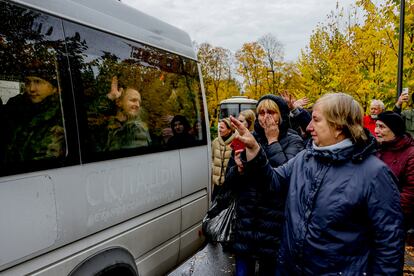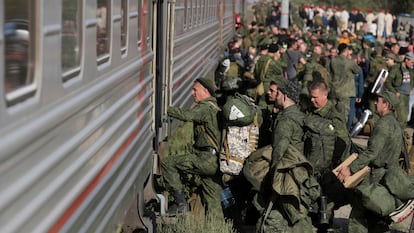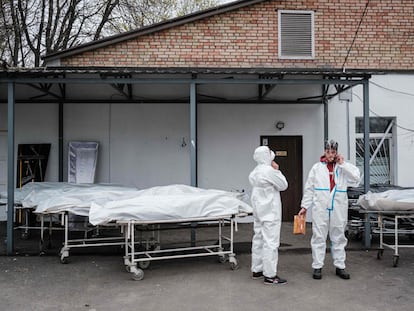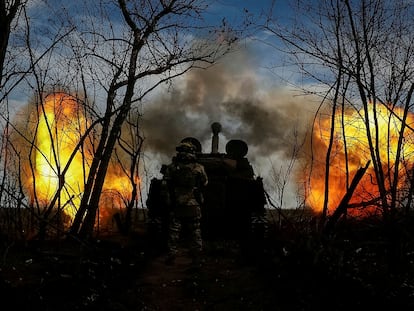Mothers and wives of Russian soldiers turn against the Kremlin’s invasion of Ukraine
Three members of the Council of Mothers and Wives were arrested last week as Vladimir Putin’s government attempts to stem a tide of public opposition to the war


A famous Soviet-era song recreates a letter from a soldier to his sister where asks her to lie to their parents. “Hey little sister, how are you? Just don’t tell mom I’m in Afghanistan,” the lyrics went. Years later, Afghanistan was replaced by Chechnya: as of yet, there is no updated version for the Ukraine war, but the mothers, wives and girlfriends of Russian military personnel are beginning to lose patience with Moscow’s invasion. Not so much because of the war in itself – whether it is a just campaign or not is of secondary importance for the majority of them – but due to the conditions under which their loved ones have been sent to the front lines and, increasingly, because they don’t know what has become of them. The Kremlin, only too aware from the experience of past wars how much pressure public opinion can exert, is attempting to stop the situation from snowballing.
Last Thursday, the leader and two members of an organization called the Council of Mothers and Wives were arrested at a checkpoint in the Samara region, in the southwest of the country. “We believe they were waiting for us. They told us that they had reason to believe we were transporting narcotics,” Olga Tsukanova, the head of the group, said. They were taken to a police station and administrative proceedings were opened against one of the them for allegedly disseminating extremist material. A few hours later, they were all released.
“This system is afraid of popular unity. They are afraid of us, and they are targeting women who are trying to protect their boys,” Tsukanova wrote in an open letter last Saturday. Her association, which was founded in September, has served as a catalyst for thousands of women who had no other way to voice their complaints about the circumstances in which their loved ones are fighting at the front.
The Council of Mothers and Wives has been promoted by another minority organization, the Union of All People for the Rebirth of Russia, which seeks “a return to the point where the Soviet Union collapsed and the restoration from there of the USSR in practice and legally.” However, many pro-Kremlin media outlets have accused the group of maintaining links with opposition figures and foreign elements with the objective of stirring up the consciences of Russian families, “given that any normal person suffers with and has sympathy for those sacred words: ‘a soldier’s mother.’”
However, the group’s supporters reject these accusations. “In our country any opposition is suspected of being at the very least from extremists, sectarians or scammers. All sponsored by the CIA, of course,” said one member, Yulia, in a video. “These women defend our country better than the men do.”
The only evidence presented against the group is an alleged excerpt from a video conference with a Belarusian media outlet featuring an exiled journalist. The association declined to speak to EL PAÍS after new legislation came into force that prohibits Russian citizens from revealing details about Vladimir Putin’s partial mobilization. Punishments for doing so range from fines to being added to the Kremlin’s blacklist of foreign agents. However, the group already has more than 20,000 followers on social media and every day fresh cases from the mothers of Russian soldiers in Ukraine come to light.

Missing soldiers
“There is no support for mothers looking for their children. Some have been taken prisoner, of others nothing is known. We go to the morgues and to the military authorities and nobody helps us, they just throw us out,” Yulia, who is from the Siberian mining basin of Kuzbass, said a few days ago. Irina Chistyakova, whose son was missing for almost eight months before she found out that he is a prisoner of war, said in another video that the only help she received in her search was from the Council of Mothers and Wives.
The association also questions the fairness of the draft ordered under Putin’s mobilization. At the beginning of October, it asked the Russian president and the Defense Ministry a simple question: “Have the sons of high-ranking officials, oligarchs and television stars been mobilized? And if not, why not?” Putin’s spokesman. Dmitry Peskov, fell prey to a telephone prank when his son answered a call from a supposed military recruiter and answered that he was exempt from being called up and would resolve the matter “at another level.”
Almost three months after the mobilization began irregularities are still occurring, posing further problems for the Kremlin. For example, despite conscription having officially come to an end, several citizens of Uzbekistan and Belarus who do not even hold Russian citizenship have been called up in Chelyabinsk.
Non-political movement
The Union of the Committees of Soldiers’ Mothers of Russia, the country’s largest and most prestigious organization, has faced fewer problems. Founded in 1989 in the final days of the Soviet Union, it comprises over 50 local associations and has so far managed to remain off the Kremlin’s radar by limiting its activities to collecting donations, food, clothing and medicines for troops in Ukraine. However, despite its neutrality, the group was not invited to a meeting of soldier’s mothers staged by Putin on November 25. Any dissent must be filtered, and the union offers legal assistance to those who believe they do not meet the criteria to be drafted as well as fielding other complaints from the families of military personnel.
“My brother volunteered and has not received any pay for five months of service. We wrote to the Military Prosecutor’s Office and the Commissioner for Human Rights, and the result has been zero. The lines at the Ministry of Defense are constantly busy,” said Anna, from Bryansk, in one of the thousands of complaints written on the forum through which the organization helps relatives.
Another common complaint is that medical reasons for avoiding the draft are given short shrift. “My son went to the recruiting office to claim [exemption] on health grounds (he was previously diagnosed with first-degree hypertension). At the medical examination they ignored the documents, they wouldn’t let him leave and the same day he was sent to the army,” Sergey Ivanov said on the same forum.
During the early days of the mobilization, many protests arose in the provinces most affected by conscription, although these were swiftly repressed. Hundreds of thousands of Russians have fled the country but others also enlisted as volunteers. Many more have turned out for the recruiters through a combination of fatalism and resignation. “They don’t care, their lives aren’t going anywhere here. There is no future in Siberia and they said at least it’s something different,” one young woman told EL PAÍS on condition of anonymity. Her cousins were subsequently called up.
Some mothers consider the sacrifices of their boys to be a heroic act. During her meeting with Putin, one woman recalled the death of her son Konstantin Pshenichkin: “The enemy was closing on his position. He jumped out of the trench and called for fire to be directed at him. His last words were: ‘Come on, boys, let’s make mincemeat of the ukros.’”
For others, however, the war has changed their lives in a different way. Zinaida, whose son was killed at the front shortly after being mobilized, thanked the government last November 27 – Mother’s Day in Russia – for opening her eyes. “Cruelly and painfully, you have awakened me. From my mother’s soul I hope you experience in this life the hell you have put us through.”
Sign up for our weekly newsletter to get more English-language news coverage from EL PAÍS USA Edition









































